| « Chicago Live! | I Am Number Four, Unknown, Kaboom, And Everything Is Going Fine & Oscar Shorts » |
Feature Thu Feb 17 2011
Hanging on by a Sequin
This story was submitted by Rachel Rabbit White. All photos by Edmund X. White.
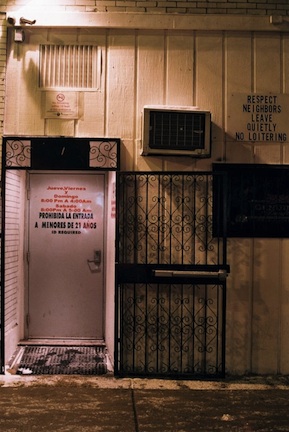
The stretch of 26th Street that makes the heart of Chicago's Little Village neighborhood is vibrant on a Friday night. The smell of taco stands is warm and inviting in the cold, as people bustle amongst the colorful stores -- joyerias and a chain of boutiques named, curiously, Brazilian Seduction Jeans. In the midst of this is a bar with no sign. But locals know this is La Cueva, a Spanish speaking-only bar where women with false eyelashes and hair like exotic birds writhe and lip-sync to Mexican pop music.
La Cueva is an LGBTQ historic site -- it is known as the oldest Latino drag bar in the country. This is a bit of a misnomer, as the performers are women -- male to female trans women. La Cueva has been around for 30 years, providing a place for trans Latinas to work and gay Latinos to belong. But the bar has recently been the center of controversy: in September, Little Village residents began protesting for La Cueva to close. Opponents say the bar has become a site for drug dealing and "transgender prostitution."
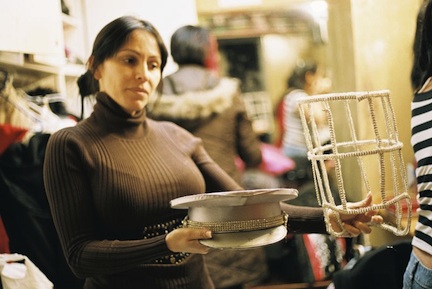
Ketty Teanga started the drag shows at La Cueva. Having successfully done drag at mainstream clubs in New York and Puerto Rico, she wanted to bring the same to Chicago's Latino community. Now in her sixties, Ketty can still be found watching the shows from the bar on most nights -- her hair still coiffed, lips puffed but body now shaky. She says what set La Cueva apart was the sexual energy. "I was singing, the saxophone was playing. And I just started to take off my clothes. And my body was so curvy from the hormones. That is when the shows became about femme, not men in drag," she says.
Teanga presses that La Cueva has become much more safe over the years. "There were a lot of gangsters and they'd throw bottles and shoot at us with BB guns. You had to park your car and run inside." Teanga explains that the neighborhood has always been rough, that this area of 26th has always been known for prostitution and drug dealing.
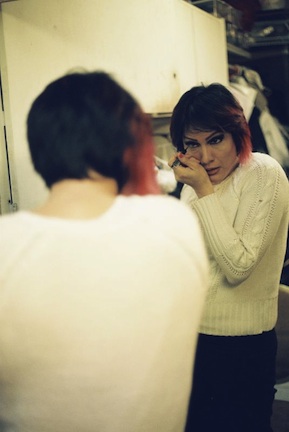
According to La Cueva's manager, Ruben Lechuga, the bar itself was feistier in the beginning, with fewer bouncers and more fights. The patrons were more macho -- straight males. "It is all gay now and more lesbians. In my day, it was straight men," says Teanga, a little longingly. "Not even in New York or Puerto Rico was it gay. In my time, I was seen as a woman, so it was [straight] men who came."
On a slow snowy night at La Cueva, two lesbian couples arrive just after midnight to cuddle at dark tables while gay couples slow dance under the disco ball. At the bar, there remains a few solo Mexican cowboys.
Even as La Cueva becomes a gay safe haven, the focus remains on the trans performers. Off stage, sans make-up, they are radiant and beautiful. Onstage they are transformed into glamorous creatures, their acts perfected with glittering evening gowns, teeny bikinis and lip-syncing. In between acts, the women wait tables and chat amongst each other. It is easy to sense a strong bond between them.
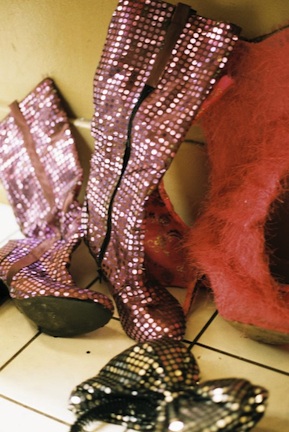
As each girl opens up about her story in an interview, the others listen and nod. "I would play with my sister in Mexico. We played tea party and made cookies with sugar. My mom would get mad because I would wear her dresses. That's how my life started," says Paula, a petite performer. "As an adolescent, they knew. My aunt had seen me go to different towns with dresses and makeup on. I have five brothers and I thought they were going to beat me up or kick me out."
Though Teanga came of age decades before, her story is similar. "I was nine years old and wearing my mother's heels. All my life I knew. I decided to really be a woman when I was 15, and started doing shows in Puerto Rico." But what has changed, according to Teanga, is how much easier it to to transition. "I took hormones from a Mexican doctor in New York, in the '70s. It was very different back then. You could transition, but you still had to dress like a man on the street, because you would get harassed. Only on the weekends could you be a woman -- this was in New York, not even Puerto Rico! Now, the door is more open for the girls."
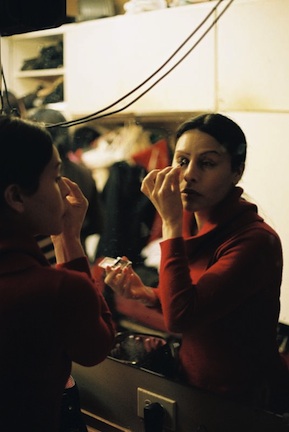
La Cueva has become a place where Spanish-speaking Latino trans women can find work -- which is no easy task. "The girls come here looking for work and if they are needed, we offer them a job," says Lechuga.
"I have worked here for 10 years," says Vanessa, who is soft spoken in contrast to her persona onstage, where she dances seductively in an outfit made of perfectly taped leaves. "Before, I worked out in the fields in Mexico, but I always dreamed about working in a place doing what I do now."
When the topic turns to the protestors' claims, emotions bubble over. "I've been working for La Cueva for nine years," proclaims Paula. "I worked in other places like restaurants and temp office jobs and I had problems. People frown upon us. When you apply, you must use your male name, but you look like a woman. They have issues with you going to the women's bathroom. The truth is, there is a lot of prostitution in our community, but here we have jobs. We are all waitresses as well as performers, so we don't need to do that." Vanessa adds, "This is not the first time there have been protests. The people who are protesting in reality don't know us. I encourage them to come in and look."
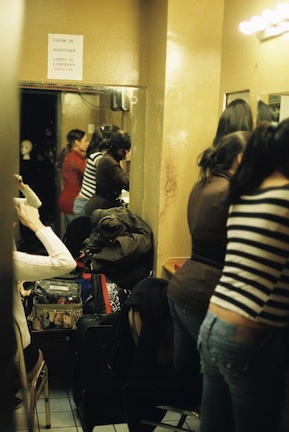
Turning to prostitution out of necessity has long been an issue of discussion within the trans community. "Transphobia has curtailed employment opportunities," explains Richard T. Rodriguez, associate professor of Latina/Latino Studies at University of Illinois, Champaign-Urbana and recipient of their LGBT Resources Leadership award. "Latina trans women, like African American trans women, are also subject to racism. But when you add language to the mix, Latina trans women may find it increasingly difficult to find jobs outside of sex work. It must be clarified that not all trans Latinas (or trans women in general) resort to sex work, but sex work remains one of the few employment opportunities available to them given the phobic attitudes directed at them by employers."
Teanga adds that while there has always been prostitution in the neighborhood, it is mostly gay male sex workers. "I don't see the girls in La Cueva on the streets. A lot of girls working in nightclubs will clean offices during the day."
Lechuga worries that the protestors will force the bar to close. "They are blaming us for prostitution that goes on a few blocks away. There are people in the neighborhood who try and get signatures to close the place down. I'm worried because those people don't know La Cueva. They've never been in here; they only imagine what goes on."
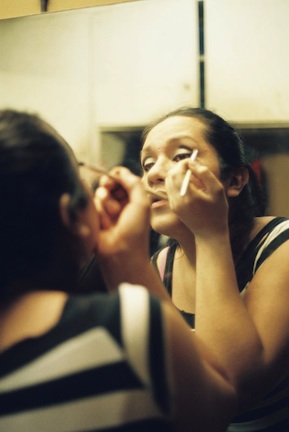
According to the performers, these residents are protesting because they are highly religious. Mexico may have legalized gay marriage but Vanessa and Paula assert that homophobia within the Mexican community remains. It seems as gay issues get more press, this tension grows. "In Mexico they changed the law to where gay marriages are allowed, but they will still call you out on the street or yell dirty things, much worse than here," says Paula.
Vanessa, like most of the performers, has had this affect her relationships. "There are some members of my family that will never take to me. We never talked about it, they found out because of my surgeries. But my mother has come to understand and respect me, and that's all that matters."
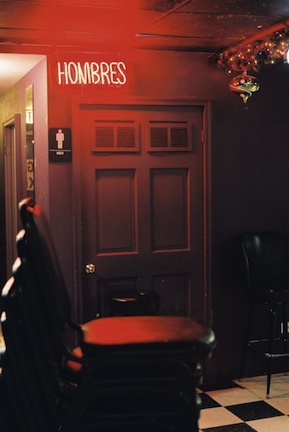
Lechuga, while straight-identified, is no stranger to this problem. He had two gay cousins who both died of AIDS, one who lived in Mexico and one in LA. "My cousin who lived in Mexico had a hard time getting proper medical attention because no one wanted to get close to him or touch him," he says.
But in her 50 years of being out as transgender, Teanga has seen a change in the attitudes of the Latino community towards gays. "Latinos are just more positive about it, they are becoming more proud. Yes, of gays and somewhat of transgender."
According to Rodriguez, as the gay rights movement moves forward, so must trans issues. "While educating people on transgender lives is key, I also believe there must be a more concerted effort by queers and straight allies alike to advocate for the rights of transgender people. Unfortunately middle-class, privileged issues like gay marriage continue to overshadow the blatant racial and economic discrepancies faced by those purportedly accounted for in the LGBT community."
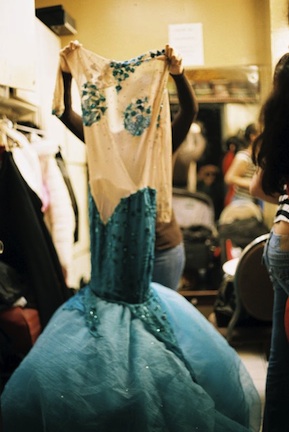
What sets La Cueva apart is its history. The bar now stands as a truly open and inviting place, accepting anyone with an interest in what goes on behind its mysterious doors. But still yet, it is all about the girls. "I do believe that we are a bit different from the rest because Puerto Ricans have come and said that we are one of the best shows in Chicago," says Paula. "They say it's that the women here are the most beautiful. And so that inspires me, and if I see they are giving good tips then I'll add more fuel and perform better."
The performers as well as La Cueva remain strong after three decades, even without a sign on the door or an official listing by the City of Chicago's neighborhood website. Whether the protestors succeed or not, the Latino LGBT community is undeniably vital and La Cueva's people are part of the village.

This feature is supported in part by a Community News Matters grant from The Chicago Community Trust and the John S. and James L. Knight Foundation. More information here.









MrBrownThumb / February 17, 2011 1:27 PM
Teanga adds that while there has always been prostitution in the neighborhood, it is mostly gay male sex workers. "I don't see the girls in La Cueva on the streets. A lot of girls working in nightclubs will clean offices during the day.
Maybe Teanga should hang out on 26th Street after the bar closes to see the prostitution? Perhaps it isn't the girls who work in the bar who are doing it, but they are definitely transgendered females hanging out on the sidewalks and corners around the bar after it closes. You don't loiter on 26th Street late at night unless you're doing something illegal.